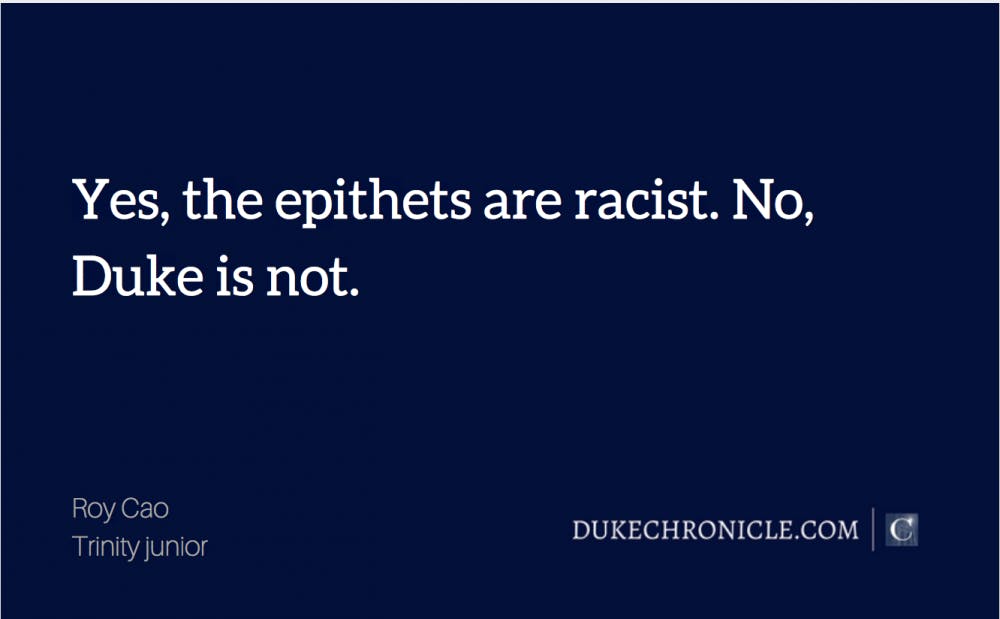Duke is a hot spot in this September—not because of the temperature (which tends to make people chill, by the way)—but because of pressing controversies. Racist epithets written on the wall. The case to rename Carr. For students armed with a firm sense of social justice, these events are more than capable of riling up the hardest nerves. Hosts of upperclassmen descend upon the site to deliver a grand protest to the befuddled freshmen, demanding that Carr be renamed. Activists bombard the admin with letters of complaints about the epithets. As voices of protest grow louder, the claim that “Duke is racist” for allegedly failing to fully satisfy the activists’ demands becomes more and more visible. Unfortunately, they have the wrong guy.
Yes, the epithets are racist. No, Duke is not. Racist incidents like this have happened in the past: hanging a noose from a tree at Bryan Center, the n-word on the door at 300 Swift, etc. These occurrences are isolated in nature. There was no sign of organizational conspiracy on the university’s behalf to produce incidents such as these. The culprits are all random individuals out of the blue. To claim Duke is racist because of a few bad apples is immense disrespect to anyone who is a part of Duke, which includes the student body that the activists are a part of. The university, moreover, never sanctions such actions. Some activists think since Duke doesn’t have a standardized policy to punish the individuals committing these acts, it is condoning racist events. Such assumption is whimsically arbitrary at best. First, who is going to say what constitutes “racist” speech or acts? Is Duke supposed to employ a specialized police force to track down and purge? What if it deems the blue devil racist? The Chapel? Students’ Facebook posts? A witch hunt would most likely do more unforeseeable damage to the unity of the student body than good, as everyone would have look over their shoulders at every moment.
Those who commit racist acts should still be punished, of course. But because the incidents are random in nature, a non-standardized policy would serve the purpose much, much better, since the perpetrator is likely a student like the rest of us, and because every case is different. A racist joke made carelessly should not be equated to vicious, orchestrated attacks on the presence of students of color on campus. Even if there is a standardized policy in place, who is to say what punishment should be accorded to whom?
Yes, Julian Carr was a racist. No, Duke is not. I do not defend keeping his name on the building, but the claim that Duke is racist because of the building is outright ridiculous. Carr lived at a time when racism was prevalent and an accepted norm in America. He was a known white supremacist and, sadly, it was morally acceptable to be that way at his time. Taking his donations, however, does not constitute an act of racism. It does not discriminate against racial minorities. It would be reasonable to think that Duke would name a building after him at the time the donations took place. Personally, I like to keep everything in their original shapes. We should examine people in their historical context instead of looking at them through revisionist lens. After all, even Abraham Lincoln thought the abolition of slavery might be unnecessary if the Union could be preserved without it, but if the activists want to rename Lincoln Memorial due to this racist view, who are we to say nay?
Heaping blame on Duke as a whole because of past legacy or a few outlandish individuals is irresponsible stereotyping. It lacks the critical thinking required to find the root cause behind racist incidents and, most importantly—
It has no chill.
Roy Cao is a Trinity junior. His column runs on alternate Fridays.
Get The Chronicle straight to your inbox
Signup for our weekly newsletter. Cancel at any time.

